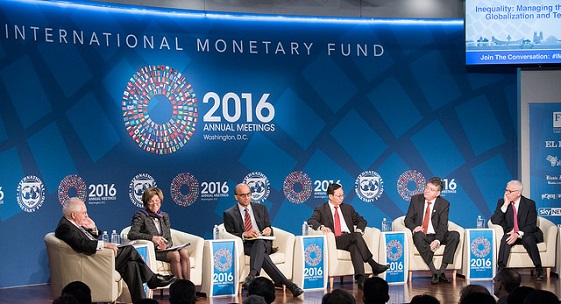
Cause, Cure for Inequality Lies in Policies
October 7, 2016
- Inequality within countries is on the rise
- Policy, trade, technology all play role
- Redistribution does not hurt growth
Inequality within countries is on the rise, and policymakers can combat the economic, social, and political impact with a mixture of tax policy, income transfers, and education—which is often difficult to achieve.
Related Links
“The big differences between countries has nothing to do with globalization, but with the use and misuse of domestic policy,” said Tharman Shanmugaratnam, Deputy Prime Minister of Singapore and Minister for Economic and Social Policies. “What makes inequality toxic is the combination of stagnation of incomes, and the fact that [people’s] children seem to be trapped in the same position.”
Policies to level the playing field
While inequality between countries has declined over the past 20 years, inequality within countries is on the rise.
What economists call pre-distribution policies—education, access to health care, and financial inclusion—can provide equality of opportunity and help level the playing field.
“In Colombia, what we have found is the most effective, and produces the most significant impact on distribution, but also take the longest to mature, are policies targeted to early childhood programs to make sure kids have identical opportunity,” said Mauricio Cárdenas, Finance Minister of Colombia.
Cardenas also said that redistribution is a “must” to address inequality.
Redistribution policies, such as taxes and programs that transfer benefits, address inequality and do not hurt growth. IMF research has shown there is little evidence that countries’ redistribution policies hinder growth, unless they were extreme. The IMF also advises governments on the trade-offs between efficiency and equity when it comes to a country’s choices for the right mixture of policies to address inequality.
Technology has changed and disrupted work and employment, with gains in wages in the top incomes and the erosion of middle-income jobs.
“That means machines are replacing brawn, and replacing brains,” said Laura Tyson, a professor at the Haas School of Business at the University of California, Berkeley. In response, countries need policies that “train people over a lifetime and give them the tools and the capabilities to complement the technology, rather than being substituted out by the technology.”
In a press conference during the Annual Meetings, IMF Managing Director Christine Lagarde said the world needs inclusive globalization—one that actually benefits all players, not one that only reduces inequality between countries, but one that also allocates fairly within countries and pays attention to those that are at risk of losing out.
Not moving on up
“We still think countries benefit from globalization,” said Tao Zhang, Deputy Managing Director of the IMF. “But we have to pay more attention to those left behind.”
Advanced economies are seeing the effects of inequality play out in the social and political arenas.
“Many people in the United States are not satisfied with the income inequality gap, and also the social mobility gap,” said David Rubenstein, a financier and founder of The Carlyle Group, a private equity investment company based in Washington, D.C. “Increasingly, people in our society feel they can’t get to the top, and that may be a bigger problem than income inequality.”
Politics trumps economics
The lack of mobility has political repercussions, as people fail to advance and look to globalization, trade, and immigration as the source of their struggle.
“We may not have social unrest in the United States right now, but we clearly are having deep, deep divisions about what is fair, and what can be done to make the outcome more even, and that is tied in many circles with an anti-immigration and anti-trade perspective,” said Tyson.
With advanced economies now confronting rising inequality, the debate about what countries should do has become global.
“The downside is that the reaction of the advanced economies to inequality is building walls,” said Cardenas. “Making sure that we solve the problems of inequality [in the United States] by ensuring there is no immigration, or through protectionism—all of that just makes things worse for a region like Latin America.”

